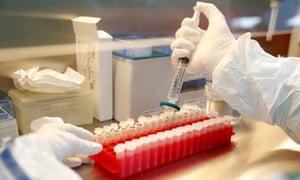- Decision is ‘real blow’ to Covax project, expert says
- White House blames stance on role of WHO and China

The US government has said that it will not participate in a global initiative to develop, manufacture and equitably distribute a vaccine for Covid-19 because the effort is co-led by the World Health Organization.
The Covid-19 Vaccines Global Access Facility (Covax) is a plan developed by the WHO, along with the Coalition for Epidemic Preparedness Innovations and Gavi, the Vaccine Alliance, and is meant to accelerate the development and testing of a vaccine and work toward distributing it equally. The WHO announced last month that more than 170 countries were in talks to participate in Covax.
Asked to confirm a report in the Washington Post that the US will not be joining Covax, a White House spokesman, Judd Deere, said in a statement: “Under President Trump’s leadership, vaccine and therapeutic research, development, and trials have advanced at unprecedented speed to deliver groundbreaking, effective medicines driven by data and safety and not held back by government red tape.
“The United States will continue to engage our international partners to ensure we defeat this virus, but we will not be constrained by multilateral organizations influenced by the corrupt World Health Organization and China.”
In a move decried by health experts, the Trump administration announced in May it was withdrawing from the WHO and cutting its funding to the organization. The US was the biggest funder of the organization, contributing $450m in membership dues and contributions to specific programs. Donald Trump alleged that the global health organization was controlled by Chinese influences.
Health experts say the US refusal to participate in Covax means that it is betting on the efficacy of its own vaccine development and encouraging other countries to do the same, which could potentially lead to hoarding of the vaccine and higher prices for doses.
Suerie Moon, co-director of the Global Health Center at the Graduate Institute of International and Development Studies in Geneva, told the Washington Post that the US not participating in the initiative was a “real blow” to the global effort to secure a vaccine.
“The behavior of countries when it comes to vaccines in this pandemic will have political repercussions beyond public health,” she added. “It’s about, are you a reliable partner or, at the end of the day, are you going to keep all your toys for yourself?”
Instead of joining global collaborative efforts to develop a vaccine, the Trump administration has opted to focus on Operation Warp Speed, a US plan to develop a vaccine and manufacture 300m doses by January 2021. Trump has indicated that his goal is to get a vaccine developed by election day, though health experts have indicated it will probably take much longer to get a vaccine tested and approved.
Top officials with the WHO have warned against the potential impacts of “vaccine nationalism”, which would be seen if wealthier nations hoard Covid-19 vaccine doses.
“No one is safe until everyone is safe. No one country has access to research and development, manufacturing and all the supply chain for all essential medicines and materials,” said the WHO director general, Dr Tedros Adhanom Ghebreyesus, in August. “We need to prevent vaccine nationalism.”
